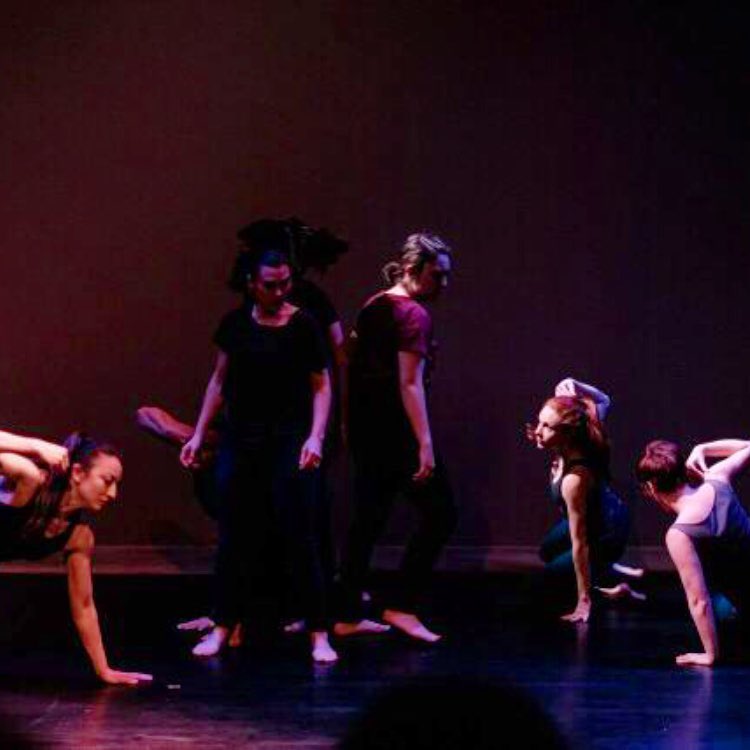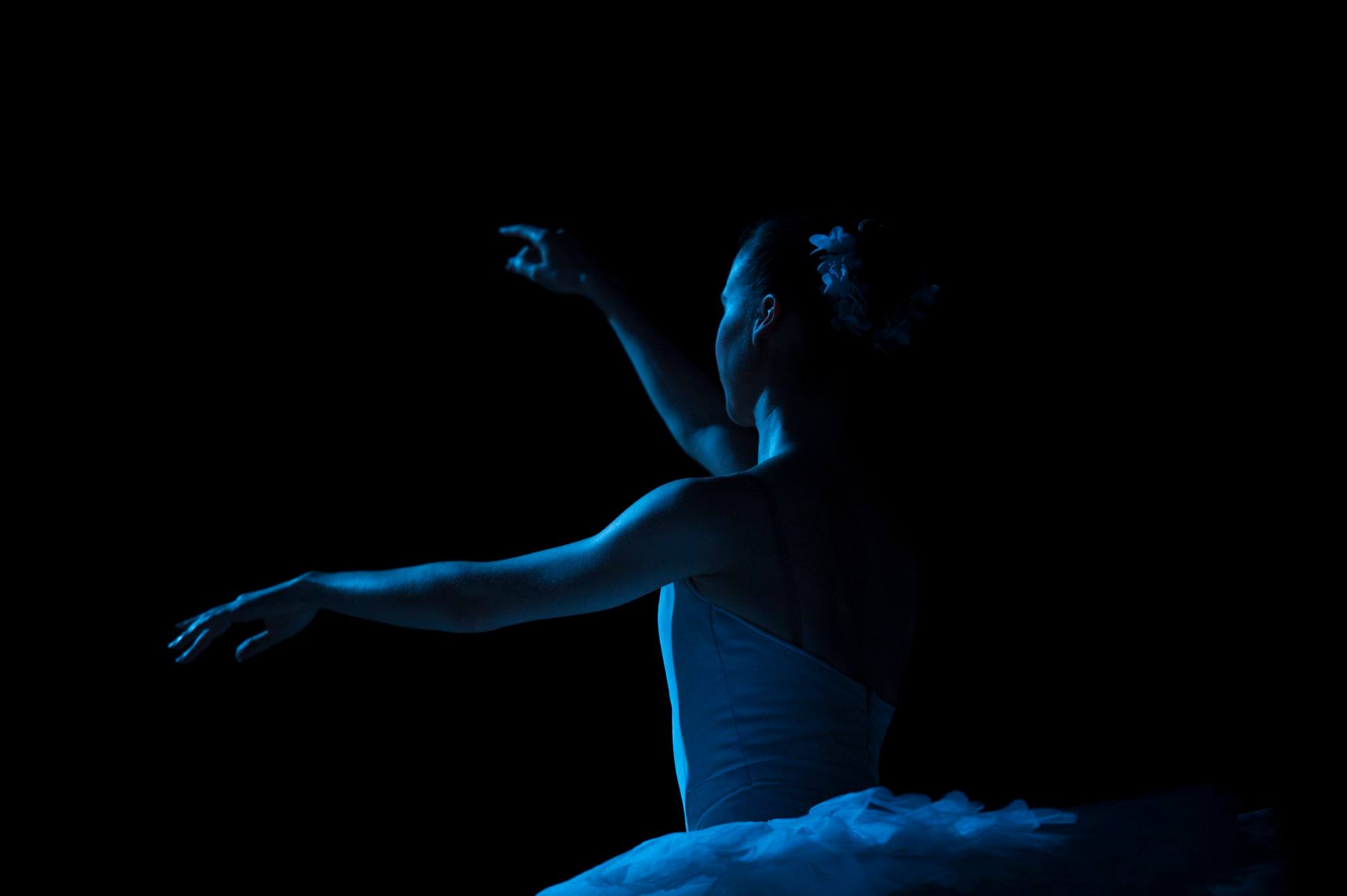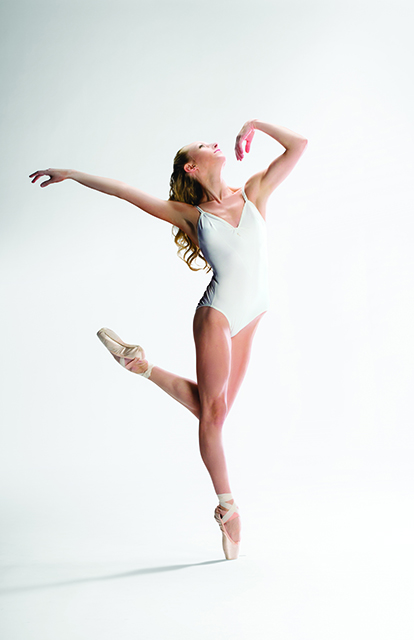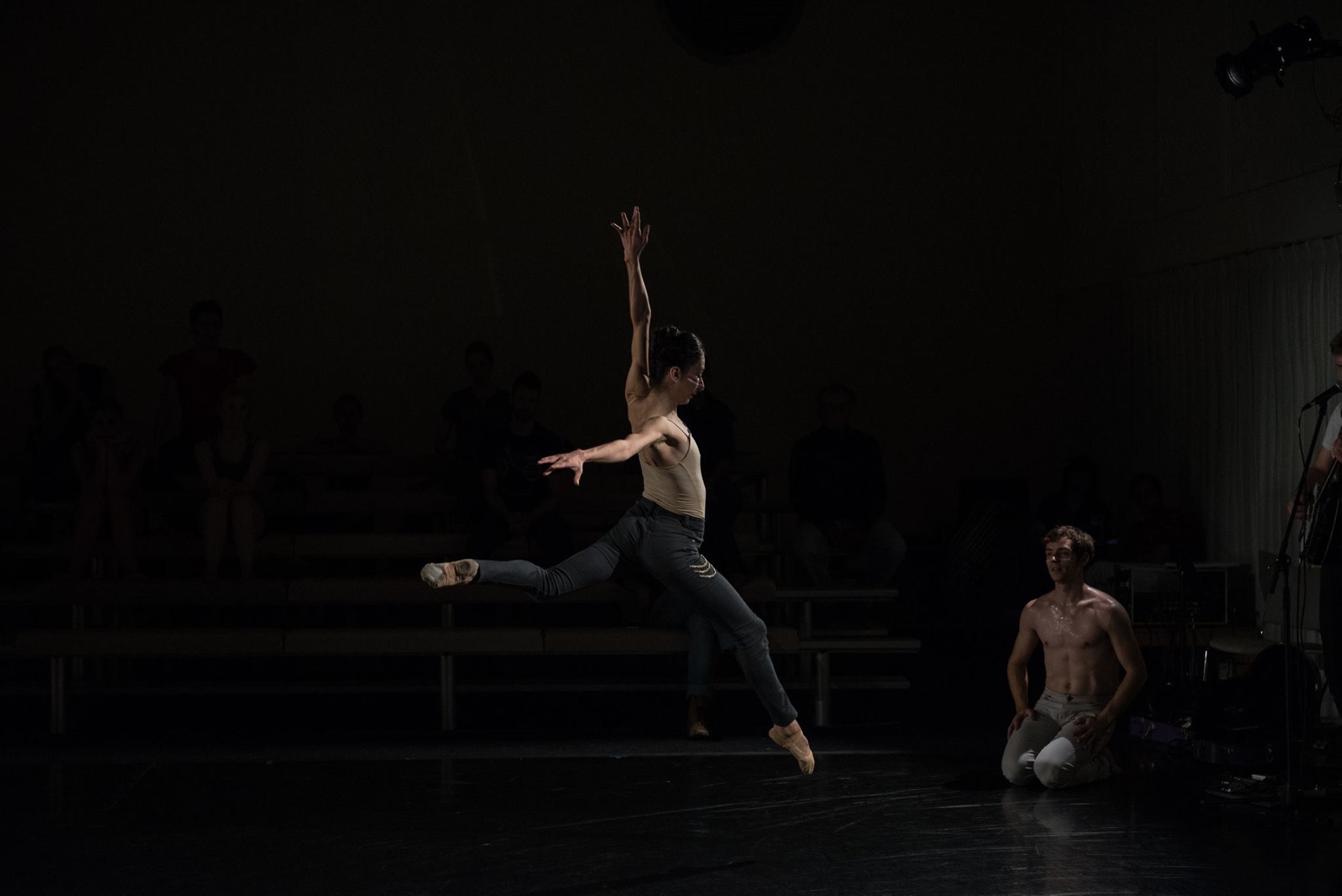Photo courtesy Moving Collective.
ID
Moving Collective
Review by Kathi E.B. Ellis
Entire contents copyright © 2017 Kathi E.B. Ellis. All rights reserved.
Moving Collective’s spring production was housed at Louisville Collegiate School’s Black Box Theatre; an intimate setting, almost too intimate for the evening’s choreography but – as co-founder Theresa Bautista explained – it was Plan B after their original space fell through a couple of months ago.
Moving Collective is to be applauded for continuing to bring together modern dance artists from several Kentucky cities; the logistics of time, travel and scheduling alone is a production number in itself. And with few modern dance outlets beyond Louisville and academic dance programs, this bringing together provides valuable opportunities for performance and support.
Nonetheless, the challenges inherent in such a wide-spread collective are also apparent on stage. While several of the dancers have been with the company for several years, there are also more recent-comers to the ensemble. And, in the full ensemble numbers in particular, there is a sense of everyone not quite knowing when sequences are full unison, or echoes/repeats of movement and gesture. In part this can be laid to the infrequent performances that the company is able to give which in turn suggests that rehearsals may either be infrequent or not regular. Although, in comments after Friday’s performance Bautista suggested that the piece has been in process since September.
ID – meaning both that part of our consciousness in which innate impulses and primary processes are held and, here, suggestive of the more colloquial ‘ID’ that we carry with us – is the company’s first full evening work in their more than ten years of existence. Comprised of seven variations choreographed by Bautista and Amanda Browning, the piece lasts around 60 minutes.
As in previous programs the stronger pieces are those that involve smaller ensembles. “The Three Headed Me” with Bautista, Lauren Frederick and Faryn Kelly was compelling, especially in the intricately created moving sculptures of the three of them including some fascinating lifts. And Bautista has a kinetic presence on stage pulling, eyes to her intensity and physical dexterity. “Stolen” (identified by Bautista as “Stolen Identity” in comments after the show, which is a much more specific and helpful title) was also intriguing. Nicole André and Amanda Rollins (in dresses as opposed to casual jeans and tops) at the beginning of this piece replicated a series of gestures and movements that embodied the idea of copying at the very least, if not actual stealing, which was then expanded into a larger variation with Browning, Frederick, Kelly, Amber Marquez, Courtney Martin, and Meghan McKinley.
McKinley took the solo role in “I Am a Pretty Girl,” by Shayla Lawson. It is challenging to create movement to text, as the trap is to create gesture that is solely pantomimic and, in large part, this trap was avoided. As the poem headed into the more toxic societal issues with prettiness in girls and women, the small but engaged audience stilled both to hear and to experience the physical description of the issues. My only concern about this piece is that, in a company that boasts some diversity, an apparently white performer was selected for a piece that clearly articulates issues of women of color; I understand the universality of some of the issues, but some were also specifically articulated about an African American girl.
“Judged” fell more into the trap of being obvious. And while many, many women and girls are judged by their appearance only, I did not feel that this piece added anything new to the conversation. Similarly, “Two Sides” appeared to spend a lot of time on comparing women’s body types. Again, our society encourages this mentality, but with nine athletic, disciplined female performers on stage I would have liked to see less attention to our physical types or a desire to rise above these societal stereotypes.
The two full ensemble pieces that began and ended the evening are, “Who Am I” and “What is lost may not be found.” Of the two, I found the former to be least intriguing. The cocoon-like coverings used for the floor gyrations seemed more predictable than fascinating and the subsequent disrobing was an unclear transition to the next piece “Judged.”
It’s tough to be an itinerant company, always having to learn a new space. Nonetheless, all of the performers could learn that untoward thumps and even the quietist whispers transmit to an audience. These distractions, together with an awkward live-but-mic’ed-and-unseen curtain speech diminished the professionalism of the company.
As Moving Collective enters into its second decade, I hope that they will be able to muster more than one or two performances a year. It’s challenging to be at the top of one’s game if the artist does not continually have the opportunity to rehearse and perform and to return to that cycle regularly.
ID
February 17-19, 2017
Moving Collective
Louisville Collegiate School
Blackbox Theatre
2440 Grinstead Drive
Louisville, KY 40204
Movingcollective.com
Kathi E.B. Ellis is an associate member of the Stage Directors and Choreographers Society and a member of Lincoln Center and DirectorsLabChicago. She has attended the La MaMa Directing Symposium in Umbria, Italy and is featured in Southern Artisty, an online registry of outstanding southern artists. Her directing work has been recognized with nominations for South Florida theatre’s Carbonell Award. Locally, Kathi is a member of Looking for Lilith Theatre Company, a founding principal of StageLab theatre training studio, and part of ShoeString Productions, an informal producing collective. She has written book reviews and articles for Southern Theatre, the quarterly publication of the Southeastern Theatre Conference, and was a contributing writer for JCPS’ textbook for the 11th grade Arts and Humanities survey course and for YouthArts Tapestry, a Kentucky Arts Council publication.





